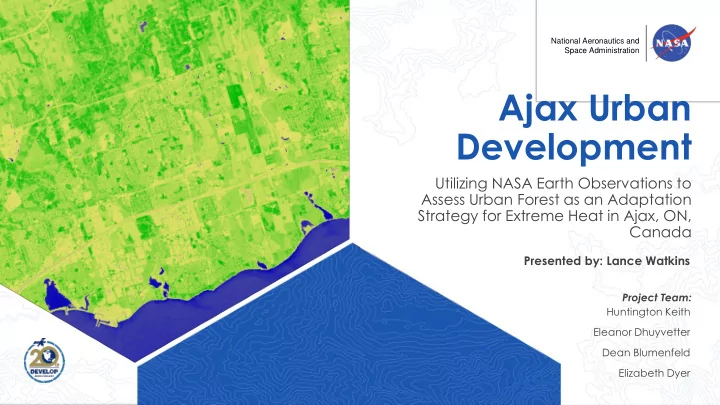

National Aeronautics and Space Administration Ajax Urban Development Utilizing NASA Earth Observations to Assess Urban Forest as an Adaptation Strategy for Extreme Heat in Ajax, ON, Canada Presented by: Lance Watkins Project Team: Huntington Keith Eleanor Dhuyvetter Dean Blumenfeld Elizabeth Dyer
What is DEVELOP? DEVELOP addresses environmental and public policy issues through interdisciplinary feasibility studies that apply the lens of NASA Earth observations to community concerns around the globe. Bridging the gap between NASA Earth Science and society, DEVELOP projects build capacity in both participants and partner organizations to better prepare them to address the challenges that face our society and future generations. NASA Earth Science DEVELOP Decision Makers
Project Characteristics All DEVELOP projects share these core characteristics: Highlight the applications and capabilities of NASA Earth observations Address actionable real-world environmental issues Partner with decision-making organizations Conducted by interdisciplinary teams under guidance of DEVELOP Science Advisors Create a comprehensive set of deliverables (Project Summary, Poster, Presentation, Technical Report, Video, Imagery, Shapefiles) Take place in just 10 weeks during three terms a year (spring, summer, and fall) Align with one of the Applied Sciences Program’s 8 application areas Disasters Health & Energy Agriculture & Food Ecological Urban Water Transportation & Air Quality Security Forecasting Development Resources Infrastructure
Ajax Urban Development Ajax, Ontario, Canada Population: 120,000 Study Period: January 2000 – December 2016 Partners Town of Ajax, Operations & Environmental Durham Region Services Great Lakes and St. Lawrence Cities Initiative Lake Ajax Ontario Toronto Arizona State University, Urban Climate Research Center
Community Concerns Recent extreme weather events have impacted the health of Ajax’s urban forest and led to a reduction in overall tree coverage. Maintaining the health of Ajax’s urban forest is essential. Changing conditions could challenge the ability of Ajax and surrounding municipalities to grow or maintain tree coverage needed to build community resilience to extreme heat. Image Credit Town of Ajax: Operations & Environmental Service
Objectives Analyze tree arrangement at the block scale Forecast tree stress based on projected changes in weather patterns Identify locations where Ajax residents are most vulnerable to extreme heat Assess the extent and magnitude of extreme heat throughout Ajax Estimate tree canopy cover and throughout Ajax Image Credit Town of Ajax: Operations & Environmental Service
Data Other Datasets: NASA Satellites: PlanetScope high resolution imagery Orthoimagery provided by Town of Ajax, Operations & Environmental Services SENES Consultants Durham Region Future Climate prediction results Landsat 5 Landsat 8 Daymet V3 Census of Canada Image Credit: NASA
Land Cover Classification Land cover analysis can 2016 differentiate small scale urban features Land Cover Classification Produce a more accurate tree canopy assessment Can be a useful input in local climate models
Urban Heat: Surface Temperature Surface temperatures varied greatly from year to year Urban core was consistently hotter than surrounding area < 22 ° C > 35 ° C
Tree Canopy Estimates Forested regions surrounding the urban core experienced greatest variation Tree canopy cover throughout urban core was consistently low (< 10% tree canopy cover) > 90% < 10%
Areas of Concern 2016 Land Social Surface Vulnerability Temperature Index < 20 C < 20 ° C Low < 23 C Moderately Low < 23 ° C < 25 ° C Moderate < 25 C < 27 ° C Moderately High < 27 C < 33 ° C High < 33 C
Acknowledgements The authors would like to thank: Great Lakes & St. Lawrence Cities Initiative: Simon Belisle, Melissa Soline, Dave Ullrich Town of Ajax: Gary Muller, Jade Schofield Project Advisors: Dr. David Hondula , Arizona State University, DEVELOP Arizona Advisor Dr. Qunshan Zhao , Arizona State University, DEVELOP Arizona Advisor Peter Crank, Arizona State University, Ph.D. Student and Research Assistant Dr. Kenton Ross , National Science Advisor, DEVELOP National Project Office This material is based upon work supported by NASA through contract NNL16AA05C and cooperative agreement NNX14AB60A. Any mention of a commercial product, service, or activity in this material does not constitute NASA endorsement. Any opinions, findings, and conclusions or recommendations expressed in this material are those of the author(s) and do not necessarily reflect the views of the National Aeronautics and Space Administration and partner organizations.
Recommend
More recommend